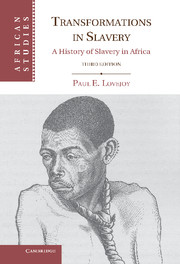Book contents
- Frontmatter
- Contents
- Maps and Tables
- Note on Currencies, Weights, and Measures
- Preface
- Preface to the Second Edition
- Preface to the Third Edition
- 1 Africa and Slavery
- 2 On the Frontiers of Islam, 1400–1600
- 3 The Export Trade in Slaves, 1600–1800
- 4 The Enslavement of Africans, 1600–1800
- 5 The Organization of Slave Marketing, 1600–1800
- 6 Relationships of Dependency, 1600–1800
- 7 The Nineteenth-Century Slave Trade
- 8 Slavery and “Legitimate Trade” on the West African Coast
- 9 Slavery in the Savanna during the Era of the Jihads
- 10 Slavery in Central, Southern, and Eastern Africa in the Nineteenth Century
- 11 The Abolitionist Impulse
- 12 Slavery in the Political Economy of Africa
- Epilogue
- Appendix Chronology of Measures against Slavery
- Notes
- Select Bibliography
- Index
- Books in this series
12 - Slavery in the Political Economy of Africa
Published online by Cambridge University Press: 05 June 2012
- Frontmatter
- Contents
- Maps and Tables
- Note on Currencies, Weights, and Measures
- Preface
- Preface to the Second Edition
- Preface to the Third Edition
- 1 Africa and Slavery
- 2 On the Frontiers of Islam, 1400–1600
- 3 The Export Trade in Slaves, 1600–1800
- 4 The Enslavement of Africans, 1600–1800
- 5 The Organization of Slave Marketing, 1600–1800
- 6 Relationships of Dependency, 1600–1800
- 7 The Nineteenth-Century Slave Trade
- 8 Slavery and “Legitimate Trade” on the West African Coast
- 9 Slavery in the Savanna during the Era of the Jihads
- 10 Slavery in Central, Southern, and Eastern Africa in the Nineteenth Century
- 11 The Abolitionist Impulse
- 12 Slavery in the Political Economy of Africa
- Epilogue
- Appendix Chronology of Measures against Slavery
- Notes
- Select Bibliography
- Index
- Books in this series
Summary
Slavery as a Mode of Production
In analyzing the role of slavery in the political economy of Africa before 1900, I have applied a number of concepts (including “mode of production,” “social formation,” and “transformation”) to examine the expansion of productive slavery. This emphasis draws on the contributions of Marxian theorists, particularly those who have explored different modes of production. Although a number of scholars have recognized the importance of slavery to the political economy, only a few have argued that slavery assumed a crucial role. Foremost among these has been Emmanuel Terray.
According to Terray, “a social formation cannot be understood except by beginning with an analysis of the relations of production which are its base,” and for Gyaman, and indeed for Asante as a whole, Terray establishes “the decisive importance of the exploitation of captives in the functioning of the social formation”:
We have tried to bring to light the existence of an Abron social formation with a mode of production based on slavery, which organizes a considerable part of the work in three essential sectors of the economy: agriculture, gold mining and transport [portage]. But one must immediately point out that this mode of production contains specific characteristics concerning the reproduction of the social relations which constitute it. We have already alluded to these peculiarities, which can be summarized as follows: there is no natural or biological reproduction of the captive population.
- Type
- Chapter
- Information
- Transformations in SlaveryA History of Slavery in Africa, pp. 267 - 280Publisher: Cambridge University PressPrint publication year: 2011

